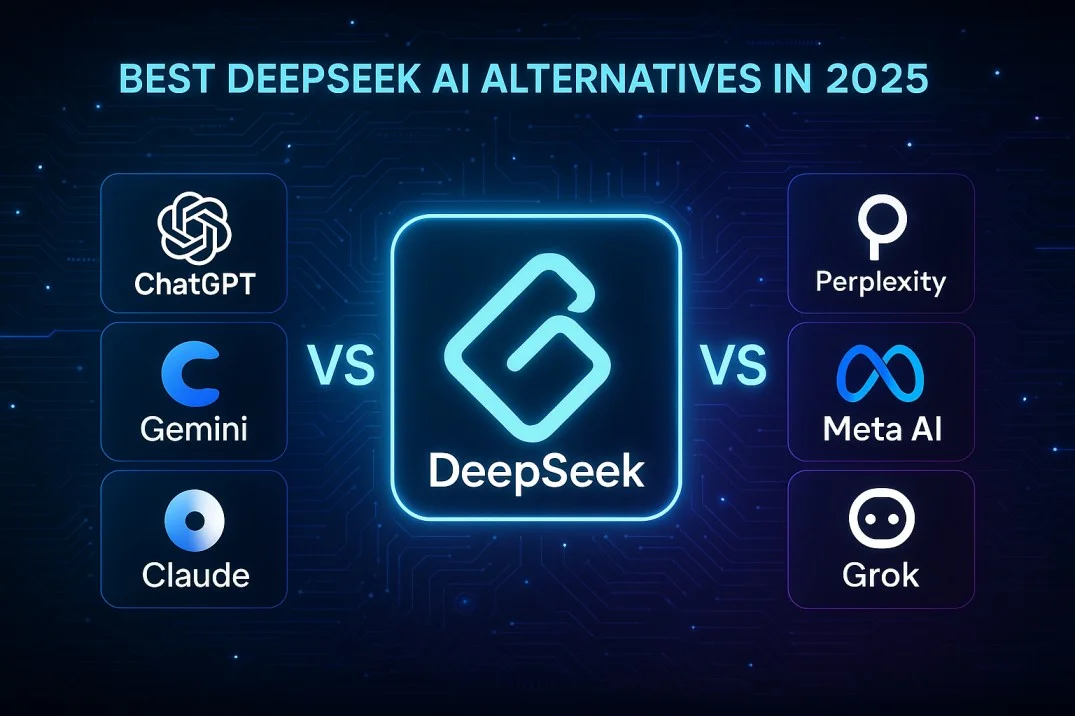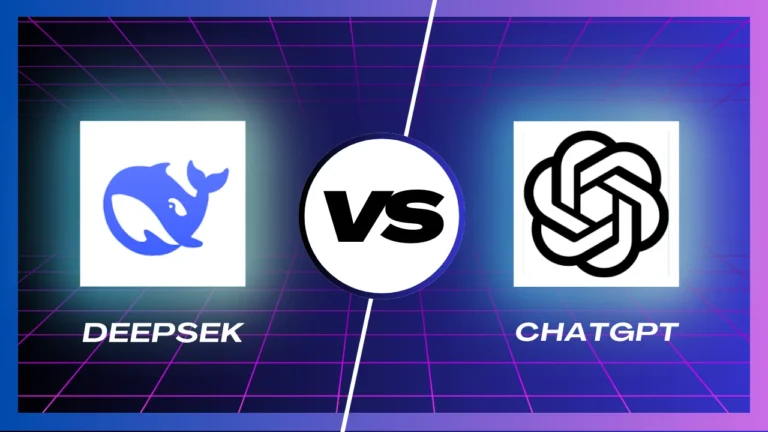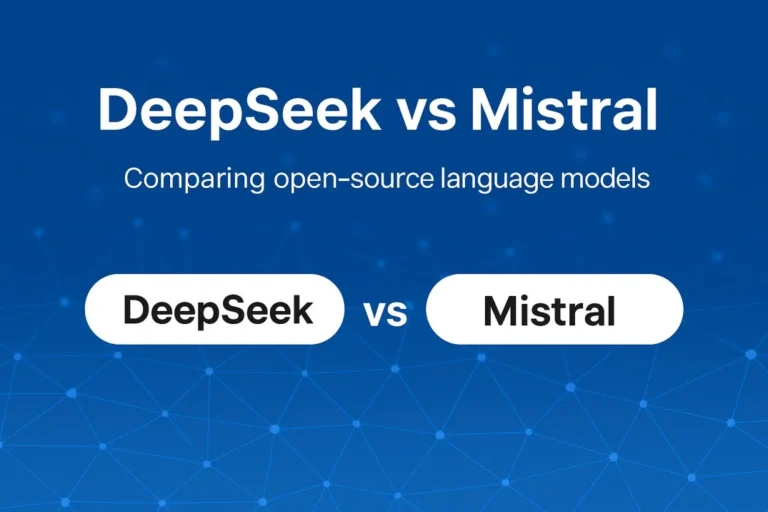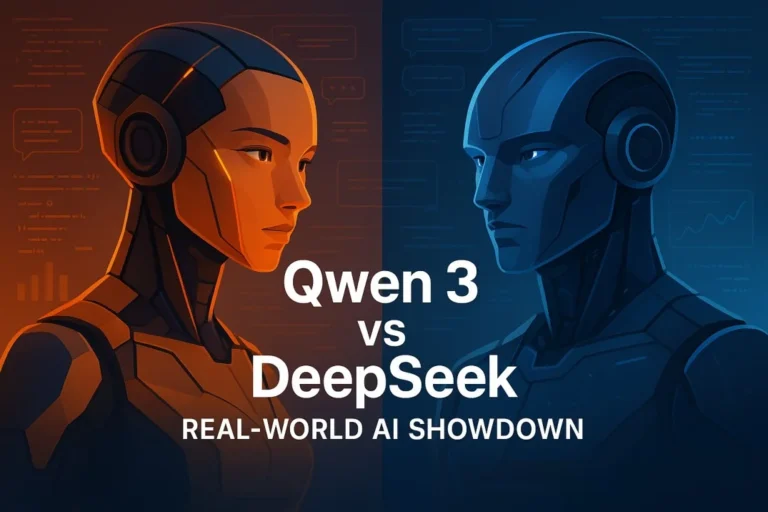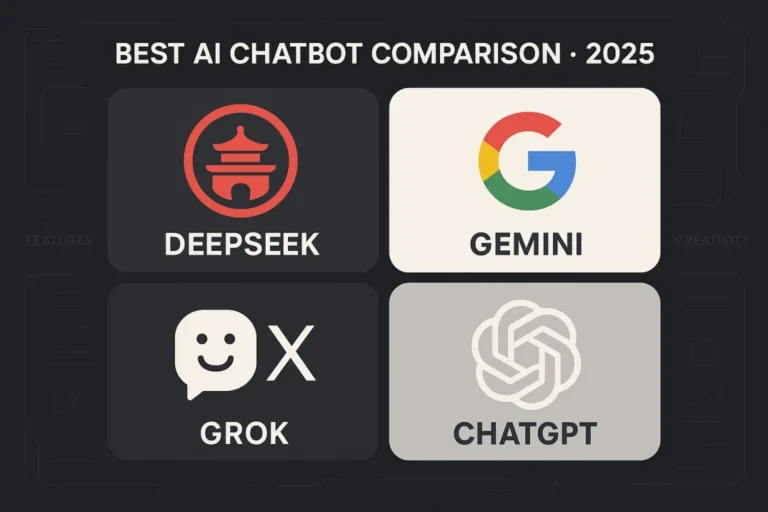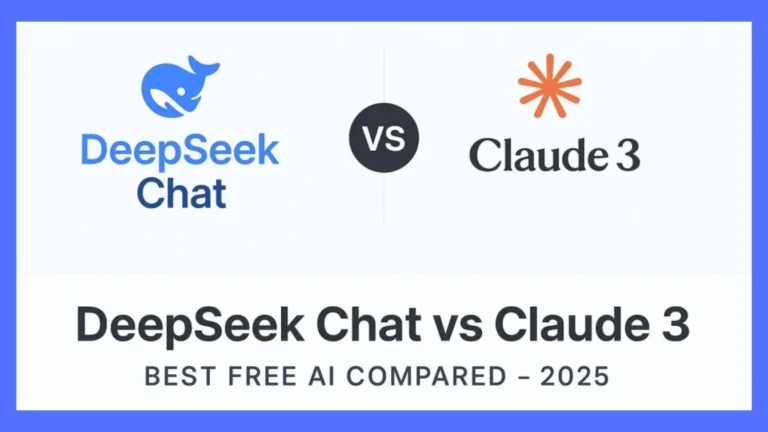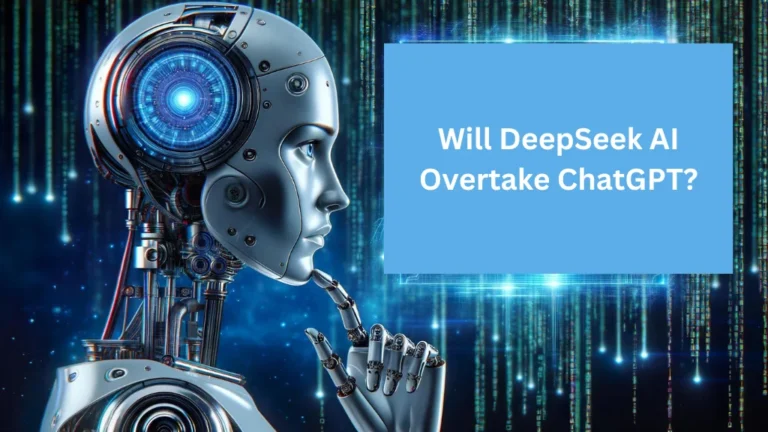In the fast-paced world of artificial intelligence, innovative tools are emerging constantly—each offering unique strengths for writing, coding, research, and productivity. One platform that has recently gained traction is DeepSeek AI. Known for its open-source foundation, multilingual capabilities, and offline usability, DeepSeek is making waves as a cost-effective alternative in the AI landscape.
While tech giants like OpenAI and Google invest hundreds of millions of dollars into training their AI models, DeepSeek has developed competitive language models—DeepSeek-V3 LLM, DeepSeek-Coder, and DeepSeek-R1—with a budget of under $6 million and less-advanced hardware. Despite its limited resources, DeepSeek has delivered impressive performance that rivals leading AI systems. However, like any tool, it may not be the ideal fit for every use case.
Whether you’re a student, developer, content creator, or business professional, choosing the right AI tool can significantly enhance your workflow. In this article, we’ll explore the best DeepSeek AI alternatives in 2025—comparing their features, pricing, and ideal use cases—to help you decide if it’s time to make the switch.
What is DeepSeek AI?
DeepSeek AI is a cutting-edge artificial intelligence platform developed by DeepSeek, recognized for its contributions to open-source AI tools. Unlike many mainstream AI models, DeepSeek stands out by offering local deployment capabilities, allowing users to run its large language models (LLMs) directly on their own systems — without relying on the cloud.
The DeepSeek ecosystem includes:
- DeepSeek-V2: A powerful, multilingual text-based LLM
- DeepSeek-Coder: Tailored for programming, code generation, and debugging
- DeepSeek-MoE: A Mixture-of-Experts model that enhances performance while minimizing computational demands
DeepSeek is designed with transparency and user control in mind, making it a top choice for developers, researchers, and privacy-conscious users who want full customization over their AI tools. Its open GitHub releases have attracted a vibrant community of contributors and AI enthusiasts.
Still, despite its strengths, DeepSeek may not be the perfect fit for everyone. For those seeking real-time web access, creative content generation, or commercial-grade support, exploring other AI chatbot 2025 options might be necessary.
Let’s now look at the key features that set DeepSeek apart.
Key Features of DeepSeek
DeepSeek AI is gaining momentum in the world of AI chatbots in 2025, thanks to its flexible design, developer-friendly tools, and commitment to transparency. Here are the standout features that define DeepSeek and make it a strong contender among open-source AI tools:
1. Open-Source Foundation
At its core, DeepSeek is fully open-source. Users can download the model, run it locally, and even fine-tune it for specialized use cases. This sets it apart from many proprietary AI chatbot alternatives that lock users into cloud-only access or subscription-based models.
2. Local Deployment Capability
One of the biggest advantages of DeepSeek is the ability to run models on your local device. This allows for faster processing, enhanced privacy, and full control — ideal for researchers or businesses working with sensitive data.
3. Multilingual Support
DeepSeek AI is built to handle multiple languages effectively, making it one of the most inclusive DeepSeek AI alternatives in 2025 if you’re comparing global usability.
4. Developer-Focused Models
With tools like DeepSeek-Coder, the platform supports complex coding tasks including code generation, debugging, and refactoring. If you’re a developer evaluating the best open-source AI tools, DeepSeek is worth strong consideration.
5. Customizability and Transparency
Unlike many commercial models, DeepSeek allows for architecture-level customizations. This is a major advantage for advanced users who want to modify the model behavior or optimize it for specific industries.
Performance Strengths
- High Accuracy in Text Generation: DeepSeek-V2 is known for generating fluent, coherent responses across a wide range of languages, rivaling many commercial models in text-based tasks.
- Coding Excellence: DeepSeek-Coder shines in developer workflows, offering reliable code generation, debugging, and multi-language support that competes closely with paid tools like GitHub Copilot or ChatGPT Plus.
- Lightweight and Efficient: DeepSeek-MoE’s Mixture-of-Experts architecture allows for optimized performance with fewer resources, making it ideal for local deployment even on modest hardware.
Limitations to Consider
- No Native Web Access: Unlike other AI chatbot 2025 platforms such as Perplexity AI or Microsoft Copilot, DeepSeek lacks built-in access to real-time web data.
- Limited Creative Capabilities: If you’re looking to generate visual content, music, or advanced storytelling, DeepSeek may not be as versatile as more multimodal alternatives like Gemini or ChatSonic.
- No Official Commercial Support: Being an open-source AI tool, DeepSeek does not come with dedicated enterprise support, which might be a concern for businesses that need SLAs or integration help.
These performance factors help us understand where DeepSeek stands strong — and where some users might seek better-suited alternatives. Let’s now explore why you might need an alternative in the first place.
Why You Might Need an Alternative
While DeepSeek AI is a standout among open-source AI tools, it’s not necessarily the best fit for every user or use case. Depending on your needs—whether you’re focused on creativity, enterprise support, or real-time internet access—you may find other AI chatbot 2025 options more suitable.
Here are a few reasons why you might consider switching or supplementing DeepSeek with an alternative:
1. Need for Real-Time Information Access
DeepSeek doesn’t offer native access to live web data. If you’re working on research, news analysis, or tasks that rely on current events, tools like Perplexity AI or Microsoft Copilot may serve you better.
2. Multimodal Capabilities
Unlike some other advanced AI chatbots in 2025, DeepSeek is text-focused. If your workflow involves image understanding, voice generation, or video synthesis, alternatives like ChatGPT (with vision) or Google Gemini offer richer experiences.
3. User-Friendly Interface and Ecosystem
For beginners or non-technical users, setting up DeepSeek locally can be challenging. In contrast, platforms like ChatGPT, Meta AI, or Claude provide intuitive web and mobile interfaces, streamlined APIs, and built-in tools for productivity.
4. Commercial and Enterprise Support
DeepSeek’s open-source nature means no official support, SLAs, or managed services. If you’re running a business, this may be a dealbreaker. In that case, commercially backed alternatives like OpenAI’s ChatGPT Enterprise, Claude Team, or Google Gemini Advanced offer stability and professional support.
5. More Specialized Features
Some DeepSeek AI alternatives in 2025 offer unique strengths like team collaboration tools (Claude), integrated Microsoft Office access (Copilot), or specialized creative writing modes (ChatSonic) — things that DeepSeek currently lacks.
In short, while DeepSeek delivers great value for developers and privacy-conscious users, its limitations make it worth exploring other options depending on your specific use case.
ChatGPT (OpenAI)
Overview
ChatGPT by OpenAI is one of the most widely used AI chatbots in 2025, offering powerful natural language capabilities powered by the GPT-4.5 and GPT-4-turbo models. It’s known for its reliability, multimodal abilities, and deep integration into productivity tools. Unlike most open-source AI tools, ChatGPT is a commercial product—but one that’s evolved into a gold standard for general-purpose use.

Key Features
- GPT-4-turbo engine (faster, cheaper variant of GPT-4)
- Multimodal: Supports image input (pro version) and code interpretation
- Custom GPTs: Create and share your own AI agents with specific functions
- Plugins and Browsing: Access real-time web data, third-party APIs, and file uploads
- Memory and personalization: Saves preferences and prior chats for smarter responses
- Integrated with tools like DALL·E, Python/Code Interpreter, and data analysis
How to Use
You can access ChatGPT through its web platform at chat.openai.com, or via official mobile apps for Android and iOS. Business and API access are available via OpenAI and Microsoft Azure platforms, allowing integration into custom apps and workflows.
Pricing
ChatGPT is available in two plans:
- Free: Uses GPT-3.5 with limited capabilities.
- ChatGPT Plus: Costs $20/month and gives access to GPT-4.5 (via GPT-4-turbo), plus multimodal tools and priority access.
Enterprise-grade plans are available for teams and businesses with enhanced admin features and API access.
DeepSeek vs ChatGPT: Comparison Summary
| Feature | DeepSeek AI | ChatGPT (OpenAI) |
| Model Access | Open-source (local deployment) | Proprietary (cloud-based) |
| Multimodal Support | Text only | Images, files, code |
| Web Browsing | Not supported | Plugin and browsing tools |
| Privacy/Local Use | Strong (run locally) | Cloud-only (OpenAI servers) |
| API Access | Open-source repo | Paid API |
| Best For | Developers, privacy-first users | General users, businesses, creatives |
Verdict: Choose ChatGPT if you need high-quality multimodal responses, real-time web access, or a polished user experience. Stick with DeepSeek AI if local control, open-source freedom, or offline use is your priority.
Want a deeper comparison? Check out our detailed guide: Deepseek vs ChatGPT
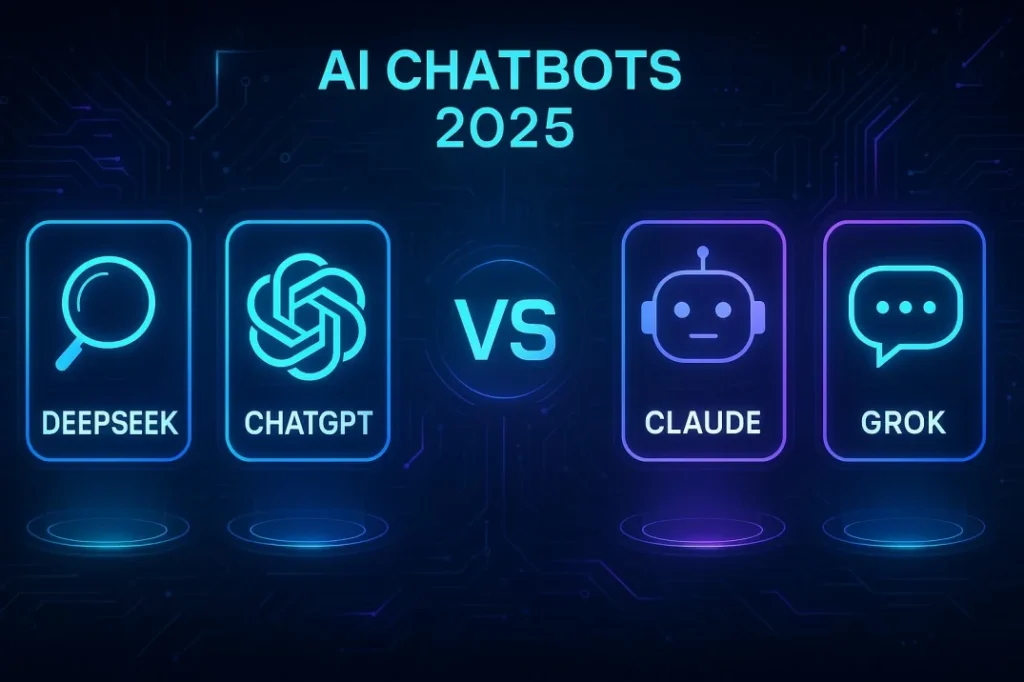
Google Gemini (Gemini Advanced)
Overview
Google Gemini is one of the best DeepSeek alternatives in 2025, developed by Google DeepMind. Designed to compete with top AI chatbots in 2025, Gemini offers multimodal capabilities, real-time web browsing, and seamless integration with Google Workspace. Though it’s not an open-source AI tool, it’s ideal for productivity-focused users who work heavily within the Google ecosystem.

Key Features
Multimodal reasoning: Understands and processes text, code, images, and even audio
Integration with Google Workspace: Use Gemini directly in Gmail, Docs, Sheets, and more
Long context handling: Supports up to 1 million tokens (Pro version)
Real-time browsing: Accesses current web data and citations
Mobile and desktop apps: Available across Android, iOS, and Chrome
How to Use
Gemini is accessible through its web interface at gemini.google.com, and via mobile apps on Android and iOS. It replaces Google Assistant on newer Android devices and is available through Google Workspace apps for Pro users. For developers, Gemini’s API can be accessed through Google Cloud’s Vertex AI platform.
Pricing
Google Gemini has a free tier that includes the basic Gemini 1.0 model. For advanced access, users can subscribe to the Gemini Advanced plan, bundled with the Google One AI Premium plan at $19.99/month. API pricing for enterprise users is managed via Google Cloud’s platform.
DeepSeek vs Google Gemini: Comparison Summary
| Feature | DeepSeek AI | Google Gemini |
| Source | Open-source AI tool | Closed-source |
| Deployment | Local installation | Cloud-only |
| Multimodal | Text-only | Text, image, audio, code |
| Web Access | No web access | Real-time browsing |
| Best For | Developers, privacy-focused users | Workspace users, general tasks |
Conclusion: Gemini stands out among DeepSeek AI alternatives in 2025 for its productivity integration and advanced capabilities. However, DeepSeek is still the go-to for developers and privacy advocates looking for customizable, open-source AI tools.
Claude (Anthropic)
Overview
Claude, developed by Anthropic, is rapidly gaining popularity in 2025 as one of the most capable AI chatbot 2025 contenders. Named after Claude Shannon, this model emphasizes safety, helpfulness, and steerability. Its latest version, Claude 3 Opus, rivals GPT-4.5 in reasoning, context handling, and creative generation.
While not an open-source AI tool, Claude is among the best DeepSeek alternatives due to its balanced performance across productivity, education, and enterprise tasks.

Key Features
Claude 3 models (Opus, Sonnet, and Haiku) bring a range of capabilities:
- Handles up to 200K context tokens (ideal for document analysis)
- Strong in summarization, legal texts, coding, and research
- Natural tone and human-like reasoning
- Integrated file uploads and rich context memory (for premium users)
How to Use
Claude is accessible via claude.ai or through Anthropic’s API. It’s also integrated with platforms like Slack and Notion, making it easy to adopt in work environments.
Pricing
- Claude.ai (Sonnet model): Free to use with basic access
- Claude Pro (Opus access): $20/month, offering full access to the most advanced Claude 3 model with higher limits and better speed
- API pricing: Based on model usage (per token), ideal for developers and businesses.
DeepSeek vs Claude: Comparison Summary
| Feature | DeepSeek AI | Claude (Anthropic) |
| Source | Open-source AI tool | Closed-source |
| Deployment | Local/offline capability | Cloud-based only |
| Multimodal | Text-only | (Images + text input) |
| Context Length | Moderate (varies by model) | Up to 200K tokens |
| Best For | Privacy, devs, offline use | Professionals, enterprise users |
Conclusion: Claude is an excellent fit among DeepSeek AI alternatives in 2025 for users who prioritize context depth, ethical alignment, and top-tier output. However, DeepSeek still leads for local control and open-source AI tools freedom.
Want a deeper comparison? Check out our detailed guide: DeepSeek vs Claude 3 – Which AI Chatbot Wins?
Perplexity AI
Overview
Perplexity AI has emerged as a strong contender in the AI chatbot 2025 race, particularly for users who value real-time web access and citation-backed responses. It’s a research-focused chatbot that blends conversational AI with a search engine experience, making it one of the best DeepSeek alternatives for fact-checking, summarization, and exploration.
Although not an open-source AI tool, Perplexity’s strong performance and usability make it a reliable alternative to DeepSeek for both casual and professional use.

Key Features
- Real-time internet access with up-to-date information
- Shows sources and citations for every response
- Supports file uploads, code generation, and academic research
- Powered by multiple LLMs including Claude, GPT-4, and Mistral
- Offers “Pro Search” and copilot functionality for deeper queries
How to Use
Perplexity is accessible directly at perplexity.ai via any web browser. It also offers mobile apps for iOS and Android, making it convenient for users on the go. Pro users can choose specific LLMs like Claude 3, GPT-4, or Gemini.
Pricing
- Free Plan: Basic features with limited model access
- Perplexity Pro: $20/month for enhanced capabilities, access to premium models, and Pro Search features
DeepSeek vs Perplexity: Comparison Summary
| Feature | DeepSeek AI | Perplexity AI |
| Source | Open-source AI tool | Proprietary, closed-source |
| Web Browsing | Not available | Real-time web access |
| Transparency | Code available on GitHub | Cites sources for every response |
| Best For | Local use, privacy, developers | Research, fact-checking, academics |
Conclusion: Perplexity AI is a standout option among DeepSeek AI alternatives in 2025, especially for users who require accurate, up-to-date information. While DeepSeek excels in offline use and customization, Perplexity offers an intelligent, search-powered chatbot with strong practical utility.
Want a deeper comparison? Check out our detailed guide: Deepseek vs Mistral
Meta AI (LLaMA 3 + Local Models)
Overview
Meta AI, driven by the powerful LLaMA 3 models, is among the best DeepSeek alternatives in 2025. It offers high-performing, open-source AI tools that are freely available for both research and commercial use. The flexibility of deploying LLaMA locally has made it a favorite within the developer community, especially for those seeking privacy-focused or offline AI chatbot 2025 experiences. Alongside DeepSeek, Meta’s open models are leading the shift toward transparent and customizable AI.
Key Features
- Open-source LLMs: LLaMA 2 and LLaMA 3
- Excellent performance in coding, reasoning, and general-purpose tasks
- Support for local deployment and fine-tuning
- Accessible via Meta’s apps (Facebook, WhatsApp, Instagram) and local tools
- Backed by Meta’s massive AI research team
How to Use
Using Meta AI depends on your goal. For general users, Meta has integrated its chatbot directly into apps like Facebook Messenger, Instagram, and WhatsApp, allowing you to chat with Meta AI in real time. Developers and researchers can download the LLaMA 3 models from Meta’s GitHub page and run them locally through tools like Ollama, LM Studio, or other Docker-based setups. These models are compatible with various hardware configurations, offering both flexibility and performance, which is why they’re often listed among the top DeepSeek AI alternatives in 2025.
Pricing
Meta’s LLaMA 3 models are completely free to use. As part of Meta’s commitment to open research, the models are released under a permissive license, making them cost-effective options for both personal and commercial projects. Unlike some commercial AI chatbot 2025 solutions that require subscriptions, you only pay for the hardware or cloud service you use to host the model—no additional fees to Meta.
DeepSeek vs Meta AI: Comparison Summary
| Feature | DeepSeek AI | Meta AI (LLaMA 3) |
| Source | Open-source AI tool | Open-source AI tool |
| Local Deployment | Yes | Yes |
| Performance | Strong on coding, text tasks | State-of-the-art performance |
| Ecosystem | Focused models (Coder, MoE) | Public chatbot + local models |
| Best For | Developers, privacy | Developers, general users |
Conclusion: Meta AI stands strong as one of the best DeepSeek AI alternatives in 2025. Thanks to its open-source nature, strong performance, and wide usability—both as a local tool and a mainstream chatbot—it’s a go-to for users who value control, flexibility, and powerful AI tools.
Qwen 2.5 (Alibaba)
Overview
Qwen 2.5 is Alibaba’s flagship open-source large language model and a strong contender among the best DeepSeek AI alternatives in 2025. Built on a powerful transformer architecture, Qwen is designed for multilingual understanding, reasoning, and code generation—making it a serious player in the evolving landscape of AI chatbot 2025 tools. It’s also gaining popularity in the open-source AI community for its impressive balance between performance and accessibility.
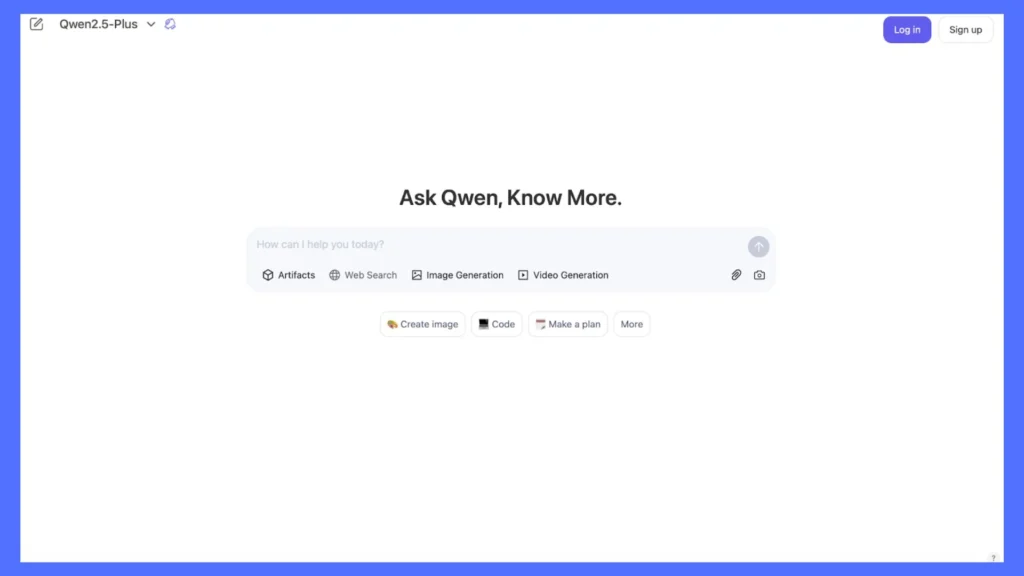
Key Features
- Open-source AI model, available via GitHub and ModelScope
- Multilingual capabilities including Chinese, English, and more
- Optimized for reasoning, code, and complex task handling
- Available in multiple sizes (Qwen-7B, Qwen-72B) for different needs
- Supports fine-tuning and local deployment
How to Use
Qwen 2.5 can be accessed in multiple ways. Developers can download and run the models locally using tools like LM Studio, Docker, or custom scripts, making it ideal for privacy-conscious users or those looking to run open-source AI tools without relying on the cloud. For commercial use or experimentation, it’s also available on platforms like ModelScope and Hugging Face. This local-first flexibility places it in direct competition with DeepSeek, especially for users who prioritize customization and independence from commercial platforms.
Pricing
Qwen 2.5 is completely free to use under Alibaba’s open license. There are no subscription fees or paywalls—users only need to handle infrastructure costs if running it locally or on the cloud. This makes it a cost-effective choice for startups, researchers, and individuals comparing the best DeepSeek alternatives based on price-performance ratio.
DeepSeek vs Qwen 2.5: Comparison Summary
| Feature | DeepSeek AI | Qwen 2.5 (Alibaba) |
| Source | Open-source AI tools | Open-source AI tools |
| Local Deployment | Yes | Yes |
| Performance | Strong on code and reasoning | Strong on language & reasoning |
| Ecosystem | Developer-friendly, GitHub-based | Backed by Alibaba, multilingual |
| Best For | Coders, tinkerers, private users | Multilingual tasks, open-source |
Conclusion: Qwen 2.5 is a rising force in the AI chatbot 2025 ecosystem. With robust performance, flexible deployment, and zero cost, it’s an excellent alternative to DeepSeek—especially for users who want multilingual support or are deeply involved in the open-source AI space.
Want a deeper comparison? Check out our detailed guide: Qwen 3 vs DeepSeek
Microsoft Copilot
Overview
Microsoft Copilot is an enterprise-focused AI assistant developed by Microsoft, integrated across Windows, Microsoft 365 apps, and GitHub. It is powered by OpenAI’s GPT-4 and aims to boost productivity through intelligent assistance. While not among the open-source AI tools, Copilot is still one of the best DeepSeek alternatives in 2025 for business and productivity users.
Key Features
- Integrated into Microsoft Word, Excel, PowerPoint, and Outlook
- GitHub Copilot available for developers (code generation, debugging)
- Based on GPT-4 with enterprise-grade data protection
- Real-time content summarization, task automation, and AI-assisted workflows
- Built-in access in Windows 11 via sidebar and Office 365 ribbon
How to Use
Microsoft Copilot can be accessed through Microsoft 365 apps or the sidebar in Windows 11. GitHub Copilot is used in code editors like VS Code for AI-powered coding assistance.
Pricing
Microsoft 365 Copilot is available at $30 per user per month for enterprise users. GitHub Copilot costs $10 per month for individuals and is free for verified students. Windows Copilot has limited features and is currently free on Windows 11.
DeepSeek vs Microsoft Copilot: Comparison Summary
DeepSeek provides flexibility, local deployment, and transparency—ideal for developers and privacy-conscious users exploring open-source AI tools. In contrast, Microsoft Copilot targets enterprise users with seamless integration and productivity enhancements. While it lacks the customization and control of DeepSeek, it remains a top AI chatbot 2025 option for businesses.
Grok (xAI)
Overview
Grok is an AI chatbot developed by xAI, Elon Musk’s AI company, and integrated into the X (formerly Twitter) platform. Designed to be witty, bold, and informative, Grok differentiates itself from other models with a humorous personality and direct access to real-time data from X. As one of the more recent entries in the AI chatbot 2025 space, Grok aims to challenge the status quo in conversational AI.
Key Features
- Trained on real-time data from the X platform (formerly Twitter)
- Built with a unique “rebellious” personality for more casual interactions
- Multimodal capabilities (under development)
- Focused on current events and trending topics
- Exclusive to X Premium+ users
How to Use
Grok is accessible via the X app or website for users subscribed to the X Premium+ plan. It is built into the platform, allowing direct interaction without needing a separate app or API.
Pricing
To use Grok, users must subscribe to the X Premium+ plan, which costs $16/month. There’s currently no free version or standalone access outside the X platform.
DeepSeek vs Grok: Comparison Summary
DeepSeek is better suited for developers, researchers, and anyone looking for open-source AI tools that can run locally. Grok, on the other hand, targets casual users who want real-time updates and witty responses from a platform they already use. While Grok doesn’t offer the control or customization of DeepSeek, it remains a unique contender among the best DeepSeek alternatives in 2025 for social media-savvy users.
Quick Comparison Table: Best DeepSeek AI Alternatives in 2025
| AI Chatbot | Best For | Free Plan | Pricing (Premium) | Offline Support | Multilingual | API Access |
| ChatGPT (OpenAI) | General use, creativity, coding | Yes (GPT-3.5) | $20/month (GPT-4) | No | Yes | Yes |
| Google Gemini | Google ecosystem, search & productivity | Yes | $19.99/month (Gemini Advanced) | No | Yes | Yes (via Vertex AI) |
| Claude (Anthropic) | Long-context, balanced reasoning | Yes | ~$20/month (Claude 3 Opus) | No | Yes | Yes |
| Perplexity AI | Real-time web research, citations | Yes | $20/month (Pro) | No | Yes | Yes |
| Meta AI (LLaMA 3) | Free, open-source AI tools | Yes | Free | Yes (self-hosted) | Yes | Yes (open-source) |
| Qwen 2.5 (Alibaba) | Offline deployment, multilingual devs | Yes | Free | Yes (self-hosted) | Yes | Yes (open-source) |
| Microsoft Copilot | Enterprise productivity, MS Office | Limited | Included with Microsoft 365 | No | Yes | Yes |
| Grok (xAI) | X (Twitter) integration, real-time data | No (Premium+) | Included with X Premium+ | No | Yes | No (currently) |
Which Alternative is Right for You?
Choosing the best DeepSeek alternative in 2025 depends entirely on your needs — whether you’re focused on privacy, creativity, enterprise integration, or cutting-edge performance.
If you value open-source AI tools and local deployment, DeepSeek still stands strong. However, each of the DeepSeek AI alternatives in 2025 listed above offers something unique:
- ChatGPT (OpenAI): Ideal for general use, creative tasks, and coding with GPT-4.5. Great if you’re looking for wide capabilities and plugin support.
- Google Gemini: Best for deep Google ecosystem integration, advanced reasoning, and multimodal capabilities.
- Claude (Anthropic): A solid pick for long context handling and safety-focused environments.
- Perplexity AI: Perfect for research, fact-checking, and real-time web access, with sources cited.
- Meta AI (LLaMA 3): A strong option for developers who prefer customizable, open-source AI tools with decent performance.
- Qwen 2.5 (Alibaba): A smart pick if you’re focused on open-source, multilingual support, and local deployments.
- Microsoft Copilot: Best for business users already in the Microsoft ecosystem, looking to automate work and boost productivity.
- Grok (xAI): Suitable for social media users who want real-time updates and a more casual, witty AI experience.
Ultimately, if you’re after AI chatbot 2025 tools that prioritize privacy, offline use, or customization, DeepSeek and its open-source cousins like Meta’s LLaMA or Qwen may be your best bet. If ease of use, features, and speed are your priority, mainstream options like ChatGPT or Gemini shine.
Final Thoughts – Is DeepSeek Still Worth It?
DeepSeek remains a solid choice in the evolving landscape of AI chatbot 2025 tools. As one of the few open-source AI tools with local deployment options, DeepSeek excels in privacy, offline accessibility, and transparency—features that power users, developers, and researchers deeply value.
However, it may not be the ideal tool for everyone. If your focus is on real-time data access, creative content generation, or commercial-grade AI integrations, some of the best DeepSeek alternatives—like ChatGPT, Gemini, or Claude—might better suit your needs.
Stick with DeepSeek if you:
- Prefer open-source, offline-friendly tools
- Need full control over deployment and customization
- Prioritize privacy and transparency
Consider switching if you:
- Need AI for business workflows or cloud-based automation
- Want advanced multimodal features or web-connected answers
- Prefer polished user experiences with premium support
Ultimately, the right tool depends on your goals. By comparing these DeepSeek AI alternatives in 2025, you can find the solution that aligns with your unique use case—whether that’s casual chatting, coding, research, or enterprise integration.
Final Thoughts – Is DeepSeek Still Worth It?
DeepSeek remains a solid choice in the evolving landscape of AI chatbot 2025 tools. As one of the few open-source AI tools with local deployment options, DeepSeek excels in privacy, offline accessibility, and transparency—features that power users, developers, and researchers deeply value.
However, it may not be the ideal tool for everyone. If your focus is on real-time data access, creative content generation, or commercial-grade AI integrations, some of the best DeepSeek alternatives—like ChatGPT, Gemini, or Claude—might better suit your needs.
Stick with DeepSeek if you:
- Prefer open-source, offline-friendly tools
- Need full control over deployment and customization
- Prioritize privacy and transparency
Consider switching if you:
- Need AI for business workflows or cloud-based automation
- Want advanced multimodal features or web-connected answers
- Prefer polished user experiences with premium support
Ultimately, the right tool depends on your goals. By comparing these DeepSeek AI alternatives in 2025, you can find the solution that aligns with your unique use case—whether that’s casual chatting, coding, research, or enterprise integration.
FAQ Of Deepseek AI Alternatives
Is DeepSeek better than ChatGPT?
DeepSeek offers more privacy and local deployment options, making it ideal for developers and researchers. However, ChatGPT is more feature-rich for general users, with better UI, plugins, and multimodal capabilities.
What’s the best free alternative to DeepSeek?
Meta’s LLaMA 3 and Alibaba’s Qwen 2.5 are excellent free, open-source AI tools. For real-time web use, Perplexity AI offers a solid free version.
Can I use DeepSeek offline?
Yes. DeepSeek supports local deployment, making it one of the few AI chatbot 2025 tools that can run without internet access.
Which DeepSeek alternative is best for research?
Perplexity AI is ideal for real-time research, offering web-connected answers with sources. Claude is also great for long-form content and reasoning.

